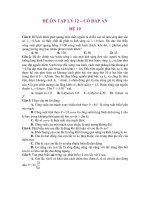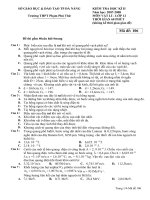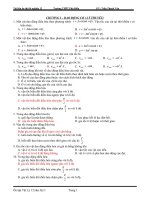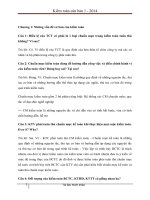- Trang chủ >>
- Sư phạm >>
- Sư phạm văn
ON TAP HKI 1718 CO DAP AN
Bạn đang xem bản rút gọn của tài liệu. Xem và tải ngay bản đầy đủ của tài liệu tại đây (165.37 KB, 9 trang )
ĐỀ CƯƠNG THI HKI ANH 8 (10 NĂM)
Thi vấn đáp 2 điểm , Đề thi viết 8 điểm
Thứ 5 (21/12/2017) lúc 7h30 tại phòng 7A8 , giám thị : Trinh + Vân
Thứ 6 (22/12/2017) lúc 7h30 tại phòng 7A8 , giám thị : An Giang + Vân
Lý thuyết
Unit 1: LEISURE ACTIVITIES
VERBS OF LIKING + GERUND (love, like, hate, prefer, adore, enjoy, fancy, don’t mind, dislike,
don’t like, detest… )
VERBS OF LIKING + TO INFINITIVE ((love, like, hate, prefer…)
Unit 2: LIFE IN THE COUNTRYSIDE
Comparative forms of adverbs
Form:
-For advs of manner ending in LY :
more/less + adv + (than)
-For advs of manner with the same form as adjs:
fast-->faster ;
hard --> harder ;
early --> earlier
late --> later
Unit 3 : PEOPLES OF VIET NAM
Review Wh-words :
-What is used for a thing: What is it?
-Who is used for a person.
Whose has the same meaning but it is always followed by a noun: Who were you talking to?
Whose car is that?
-Why is used for a reason :Why were you late?
-When is used for a time or date :When did you started working here?
-Which is used for a choice :Which do you prefer , tea or coffee?
-Where is used for a place :Where do you live?
-How is used for an amount or the way :How much does it cost?
How do I get to the station?
Articles : a , an and the
a). Mạo từ "A/AN" đứng trước danh từ số ít, đếm được, khơng xác định.
- A đứng trước danh từ bắt đầu bằng các phụ âm như r, m, n, l, b, c, d, g, h…
EX: a book
a car
a table
a glass
- AN đứng trước danh từ bắt đầu bằng một nguyên âm như: a, o, e, u, i
EX: an apple
an egg
an inkpot
an orange
b). Mạo từ "The" đứng trước danh từ đã được xác định
EX: The book which you gave me is interesting
The students in this class are hard-working
“The” cũng được dùng trước:
- Danh từ mà người nói, người nghe đều biết rõ
EX: My father is working in the garden
- Danh từ được nhắc lại trong câu
EX: There are many trees in the garden. The trees are having fruit
- Danh từ chỉ mặt trời, mặt trăng, trái đất, sơng, suối, núi, tịa nhà, khách sạn, rạp hát, trường học, câu lạc
bộ, báo chí, cơng viên…
EX: The earth moves around the sun
- Tính từ chỉ lớp người. Động từ theo sau chia ở số nhiều
EX: We should help the poor
- Tính từ ở hình thức so sánh nhất
EX: He is the most famous student
- Danh từ trong một số nhóm từ thơng dụng
EX: in the morning, in the afternoon, in the evening, in the street, all the year round…
Unit 4 : OUR CUSTOMS AND TRADITIONS
MODAL VERBS
Should or shouldn’t to express advice
(+) S + should + V( infi)
(-) S + shouldn’t + V( infi)
? should + S + V( infi)
Ex: you should learn harder
You shouldn’t eat green gruit
Should you do morning exercise?
Have to to express obligation or necessary
(+) S + have/ has to + V (infi…..)
(-) S + don’t / doesn’t have to + V(infi...)
(?) Do / Does + S + have to+ V(infi...)….?
Ex: she doesn’t have to wear a company uniform
Ex: I have to ccok dinner.
Ex: Do you have to clean the house ?
Unit 5 : FESTIVALS IN VIET NAM
A simple sentence is one independent clause.
e.g: My mother and Igo shopping every weekend.
S
V
* A compound sentence is two or more independent clauses joined together. Each clause is of equal
importance and could stand alone. They can be joined with conjunctions: and, but, or, so, yet or
conjunctive adverbs: however, nevertheless, moreover, therefore, otherwise
e.g: My fatherlikes reading newspaper, but he hates listening to the radio.
S
V
S
V
A complex sentence includes one independent clause and one (or more) dependent clause. The dependent
clause can go before or after the independent clause.
* If the dependent clause goes before the independent clause, it’ s followed by a comma (,)
E.g: While the elephants are racing, people cheer to encourage them.
* If the independent clause goes before the dependent clause, there is no comma
E.g: People cheer to encourage the elephants while they are racing,
* A dependent clause begins with a subordinator such as when, while, because, although/ even
though, if
. Từ nối ALTHOUGH, DESPITE/INSPITE OF, HOWEVER, NEVERTHELESS
- Although/ though/ even though/ Despite / in spite of: mặc dù
Although/ though/ even though + Clause (mệnh đề)
Despite / in spite of + N/ V-ing
- However/ Nevertheless: tuy nhiên
S+V. However/ Nevertheless,(dấu phẩy) S+V.
Unit 6: FOLK TALES
Past continuous tense
S + was/were + V-ing
S + wasn’t/ weren’t + V-ing
Was/ Were + S + V-ing ?
At 12 o’clock yesterday, At this time 2 days ago, when, while……
………………………………………………..
BÀI TẬP
Choose the word which has a different sound in the part underlined.
1. A. camel
B. buffalo
C. cattle
2. A. lived
B. populated
C. harvested
3. A. wanted
B. washed
C. danced
4. A. beds
B. dogs
C. posters
5. A. pictures
B. watches
C. buses
6. A. homework
B. mother
C. open
7. A. stripe
8. A. honey
9.A. charity
10.A. generate
11.A. evidence
12.A. pagoda
13.A. check
14.A .brave
15. ethnic
B. string
B. donkey
B. sticky
B. celebrate
B. device
B. hamburger
C. spring
C. survey
C. minority
C. decorate
C. saucer
C. relax
B. bracelet
C. present
B. dairy
C. way
B. spicy
C. crisp
Choose the word which has a different stress pattern from the others.
1. A. ancestor
B. curious
C. heritage
2. A. buffalo
B. recognise
C. convenient
3. A. harmful
B. slowly
C. cloudy
4. A. worship
B. belong
C. enjoy
5. A. foundation
B. location
C. organization
6. A . peaceful
B. entertain
C. minorities
7. A. wonderful
B. mountain
C. relaxing
8A. popularity
B. animal
C. vegetable
9.A. medical
B. remote
C. mountain
10.A. important
B. recognize
C. standard
11A. ethnology
B. architect
C. improve
D. paddy
D. loaded
D. watched
D. books
D. brushes
D. judo
D. trip
D. money
D. predict
D. describe
D. precious
D. gather
D. princess
D. stay
D. display
D. tradition
D. cultural
D. unique
D. behave
D. performance
D. heritage
D. satisfied
D. beehive
D. generous
D. culture
D. canal
12.A. worship
B. belong
C. enjoy
D. behave
13.A. alternate
B. entertain
C. symbolize
D. cultivate
14.A. heritage
B. museum
C. decorate
D. blackberry
15.A. minorities
B. populated
C. activity
D. experience
Choose A, B, C, D for each gap in the following sentences.
1. There's a…………….in our family that we have a party on New Year's Eve.
A. belief
B. legend
C. custom
D. tradition
2. You should buy the blue sweater. It suits you ...........than the red one.
A. good
B. well
C. better
D. the best
3. The ............ of Quan ho singing has been recognized as a world heritage.
A. preservation
B. procession
C. song
D. performance
4. Saint Giong was unable to talk, smile, or walk ......... he was three years old.
A. even though
B. because
C. while
D. if
5. It's a rule, so everyone ...............strictly follow it.
A. doesn't have to
B. shouldn't
C. has to
D. should
6. The 54 ethnic peoples of Vietnam are............, but they live peacefully.
A. similar
B. unlike
C. diverse
D. like
7. I detest................so early in the morning.
A. get up
B. getting up
C. gets up
D. to get up
8. Both my brother and I help ........... our family's goats. We feed them on the pastures by the edge
of the village.
A. herds
B. to herd
C. herding
D. to herding
9. Lang Lieu couldn't buy any special food...........he was very poor.
A. although
B. when
C. while
D. because
10. The girl was crying when a fairy...............
A. appears
B. was appearing
C. appeared
D. is appearing
11. At school, the teacher and students.............. follow the rules.
A. has to
B. have to
C. need to
D. haven't to
12. Children need a caring environment to develop............ mentally............. physically.
A. and - and
B. both - and
C. the - the
D. in - and
13. .......... you study harder, you won't be able to pass the examination.
A. Unless
B. Because
C. If
D. without
14. The buses were very .......... this morning. We can't go to the church with you in time.
A. crowd
B. crowded
C. full
D. busy
15. He ............. cross the street when the traffic light is green for pedestrians.
A. should
B. shouldn't
C. ought
D. oughtn't
16. You.................. use your mobile phone on the plane.
A. must
B. mustn't
C. don't have to
D. have to
17.Many ethnic groups have their own languages, and some even have …….. languages.
speaking
B. writing
C. written
D. spoken
18.The nomads move two or three times a year to look for new ……….. for their cattle.
A. land
B. houses
C. pastures
D. products
19.The Kinh have the largest number of people, ………..for about 80% of the population.
A. calculating
B. getting
C. accounting
D. making
20. An activity that we do for pleasure when we are not working.
A. hobby
B. leisure
C. relax
D. interest
21.The Thai villages ……..….. 40 to 50 houses, usually built side by side.
A. include
B. consist
C. comprise
D. get
22.Our family’s customs and traditions make us feel a sense of……………….
A. humor
B. loving
C. belonging
D. unique
23.The Xoe dance has more than 30 forms ………….. on the first six ancient forms.
A. depended
B. laid
C. created
D. based
24. In the past, men …………. wear Ao Dai, but today they………… wear it.
A. had to/ didn’t have to B. had to/ doesn’t have to C. had to/ don’t have to
D. had to/ had to
25.Thach Sanh was so……………….that he could push back the troops with his magical guitar
and rice pot.
A. kind
B. clever
C. hard-working
D. fast
26. Mai An Tiem was very …………to move to a deserted island.
A. brave
B. honest
C. kind
D. generous
27.When you want to express your disagreement politely, you say:
A. I am afraid I don’t agree.
B. No, I don’t like your idea.
C. No, I do not listen to you.
D. No, your idea is so bad.
28. Luu Binh was very………………. to invite Duong Le to come and live with him.
A. selfish
B. kind
C. mean
D. brave
29. The toad was very ……………..because he tried to find way to the heaven to sue God.
A. brave
B. kind
C. generous
D. mean
30. The Peacock was well known to be a/an ………… animal, so he just applied black colour to the
Crow’s feathers.
A. hard-working
B. lazy
C. ugly
D. clever
III. Give the correct form or tense of the words given to complete these sentences:
1. If she has free time, she (come)……………………. to see you.
2. When I was a small child I fancied (fly)…………………………….. kites in the field.
3.They (live)……………………………………….a nomadic life for six years.
4.Thien Nhan (win)………………………………..The Voice Kids 2014.
5.Their teacher (sing)…………………………………..an English song now.
6.We all adored ( do)……………………... aerobics when we were young.
7. years ago, we ( not have)………………..…. mobile phone.
8. The girl ( cry)………………….... when a fairy ( appear)………………………..
9. My mother says that I have to (be)………………… home by 9 pm sharp.
10. This festival (hold)…………………… to commemorate Saint Giong.
11. Tuan loves (listen)…………………. to music every day.
12……………… you ever (ride)……………………. a buffalo ?
13. The children used to (go)………………… a long way to school.
14. They hate (see)……………………… their son texting his friends all day.
There is a mistake in the four underlined parts of each sentence. Find the mistake (A, B, C, or D )
1. Vietnam is an multicultural country with 54 ethnic groups.
A B
C
D
2. We speak English fluent now than last year.
A
B
C
D
3. We broke with tradition by make sponge cakes for the Mid-Autumn Festival instead of moon cakes.
A
B C
D
4. You has to take off your hats when you go to the pagoda.
A
B
C
D
5. I don't like this performance although it's too boring
A
B
C
6. I was play football when she called me.
D
A
B
C D
7. Was you study Maths at 5 pm yesterday ?
A
B
C D
8. In Australia, you mustn’t to comment on a person’s accent.
A
B
C
D
9. In my family, children has to get permission before leaving the dining table.
A
B
C
D
10. When I come, the whole family was having dinner around a big dining table.
A
B
C
D
11. Lang Lieu couldn’t bought any special food because he was very poor.
A
B
C
D
12. John used to going to school by bus, but now he goes by bike.
A
B
C
D
13. It has been a long time since I have visited New York.
A
B C
D
14. A new school is going to build in my neighborhood.
A
B
C
D
15. The exercises were such difficult that no one could do them.
A
B
C
D
READING :
Put the words in brackets into the right forms to complete the sentences.
1. I'm so............................ about your trip. It's going to be amazing. (excite)
2. Ao dai is our ................................ dress. We wear it every Monday at school. (tradition)
3. After .......................... Food from the plate, you should put it into your bowl before eating. (take)
4. My close friend gave me a ......................... present on my birthday. I like it so much. (wonder)
5. There are many interesting things about the cultural groups of Vietnam at the museum of
………………………….... (ethnic)
6. The Mekong Delta is also famous for its ……………. floating markets and fruit orchards. (fascinate)
7. Vietnamese people are very ………………… .
(friend)
8. To Huu’s …………… are interesting.
(poetry)
9. It is an ……………. program.
(interest)
10. The garden is …………….with trees and flowers.
(beauty)
Read the passage and choose the best option A,B,C,D to complete it.
The Rice- cooking Festival
The Rice- cooking(1) .......... was held in communal house yard about one kilometer a way from a (2)......There were
three(3)....... : water fetching, fire- making and rice-cooking. The festival(4)...... one day. In the waterfetching(5)......., one person from each team had (6)............. to the river to get the(7)............. In the fire-making
contest, two team members had to make fire in the (8)...... way. They tried to rub pieces of (9)............... together to
make the fire. Six people from each team(10)...... in the Rice- cooking Festival. They had to separate the rice from
the husk and then cook the rice.
1. A. holiday
B. contest
C. festival
D. competition
2. A. mountain
B. city
C. house
D. river
3. A. holidays
B. contests
C. festivals
D. competitions
4. A. takes
B. took
C. taking
D. take
5. A. contest
B. contests
C. test
D. tests
6. A. to run
B. run
C. ran
D. running
7. A. bamboo
B. rice
C. fire
D. water
8. A. strange
B. tradition
C. traditional
D. traditionally
9. A. bamboo
B. rice
C. fire
D. water
10. A. participate
B. participates
C. participating
D. participated
Read the passage carefully and then answer the following questions.
MY VILLAGE
I live in a village by Mekong River. Every day, like most of my friends, I walk to school. It is three
kilometers away. After class, I often help my mother to collect water from the river and feed the
chickens. At the weekend, the villagers often gather at the community hall where there is a TV. The
adults watch TV, but more often they talk about their farm work and exchange news. The children run
around, playing games and shouting merrily. Laughter is heard everywhere. My father sometimes takes
me to the market town nearby where he sells our home products like vegetables, fruits, eggs… He then
buys me an ice cream and lets me take a ride on the electric train in the town square. I love those trips.
On starry nights, we children lie on the grass, looking at the sky and daring each other to find the Milky
Way. We dream of far away places.
Answer the following questions.
1.What does he often do after class?
………………………………………………………………………………………………………
2. Does the boy like riding on the electric train in the town square?
……………………………………………………………………………………………………….
3. What do the children do on starry nights?
……………………………………………………………………………………………………..
4. Do you like to live in the countryside or in the city? Why?
………………………………………………………………………………………………………
WRITING:
I. Complete each sentence so that it has the same meaning as the first one .
1. Cats cannot swim as well as dogs.
Dogs can swim...............................................................................................................................
2. Minh really loves to hang out with friends.
Minh really enjoys..........................................................................................................................
3. Playing beach games is very interesting.
It is..................................................................................................................................................
4. He uses all his free time to look after his garden
He spends.........................................................................................................................................
5.Would you please change this T-shirt for me?
Do you mind……………………………………………………………………………………..?
6. A horse can run 80km/hr while a camel can run only 12km/hr.
A horse can ………………………………………………………………………………………...
7. People have used the Internet all over the world.
The Internet ….……...…………….……...…………… all over the world.
8. My house is smaller than your house.
Your house . ………. ………. ………. ………. ………. …………………………. ………………
9. I love listening to music.
I fancy…………… ………. ………. ………. ………. ………. ……………………. …. ……….
10. The girl worked hard. Her step mother wasn't happy .
Although…………………………............................................................................................... .....
11. Tea is cheaper than coffee.
Coffee .……….……….……….……….……….………………………….……………………….
12. Huong Tram performs the song “Em gai mua ” very beautifully.
The song “Em gai mua”…………………………….………………………………………………
13.A fish swims faster than a duck.
A duck……………………………………………………………………………………………….
14. I moved to Tinh Bien eighteen years ago.
I have…………………………………………………………………………………………………
15. The tortoise was running. The hare was sleeping. (WHILE)
............ ...............................................................................................................................................
16. Do the test carefully or you may get a bad mark.
If ........................................................................................................................................................
17.Tuan often went fishing when he lived in the country.
Tuan used ……………………………………………………………………………………...
Use the suggested words and phrases to make meaningful sentences.
1. We/ have/ dinner/ when/ telephone/ ring.
........................................................................................................................................................................
2. Internet/ change/ way/ we/ communicate.
................................................................................. ......................................................................................
3. We/ spend/ two/ hour/ repair/ windows/ yesterday.
................................................................................. ......................................................................................
4. He/ detest/ join/ social activities/ because/ he/ be/ introvert.
................................................................................. ......................................................................................
5. Hani people / live/ Lai Chau / Lao Cai.
................................................................................. ......................................................................................
6. Hoa ethnic group / have/ the / colourful clothing.
................................................................................. ......................................................................................
7. Yesterday / beautiful day / so / my friend / I / go / picnic.
................................................................................. ......................................................................................
8. My mother / like / watch / folk music / news / VTV1 channel.
............................................................ ......................................................................................
9. Apsara dance/ a form/ Cambodian classical dance.
............................................................ ........................................................................................................
10.It/ known/ Cambodian Royal Ballet.
............................................................ .........................................................................................................
11.The Apsara /performed/ a woman/ a traditional dress.
............................................................ ........................................................................................................
12.The dance/ use/ gestures/ tell myths/ or religious stories.
............................................................ .........................................................................................................
13.It/ have/ a soft movement/ loudly traditional Khmer music/ during its performance.
............................................................ ........................................................................................................
14.Apsara dance/ not require/ physical ability/ but/ it/ require/ smooth movement.
............................................................ ........................................................................................................
1.→ Dogs can swim better than cats.
2. Minh really enjoys hanging out with friends.
3. It is interesting to play beach games
4.He spends his free time looking after his garden.
5. Do you mind changing this T-shirt for me?
6. A horse can run faster than a camel
7. The Internet has been used all over the world.
8. Your house is bigger than my house.
9. I fancy listening to music.
10. Although the girl worked hard, her step mother wasn't happy .
11. Coffee is more expensive than tea.
12The song “Em gai mua”is performed very beautifully by Huong Tram.
13. A duck swims more slowly than a fish.
14. I have moved to Tinh Bien for eighteen years
15. The tortoise was running while the hare was sleeping.
16. Do the test carefully or you may get a bad mark.
If you don’t do the the test carefully, you may get a bad mark
20.Tuan often went fishing when he lived in the country.
Tuan used to go fishing when he lived in the country.
1. We are having dinner when telephone rang.
2. The internet changes the way we communicate.
3.We spent two hour repairing windows yesterday.
4. He detests joining social activities because he is introvert.
5. Hani people live in Lai Chau and Lao Cai.
6. Hoa ethnic group has the most colourful clothing.
7. Yesterday was beautiful day so my friend and I went on a picnic.
8. My mother likes watching folk music and news on VTV1 channel.
9. Apsara dance is a form of Cambodian classical dance.
10.It is known as Cambodian Royal Ballet.
11.The Apsara is performed by a woman in a traditional dress.
12.The dance uses gestures to tell myths or religious stories.
13.It has a soft movement and loudly traditional Khmer music during its performance.
14.Apsara dance does not require physical ability, but it requires smooth movement.
-
THE END –









